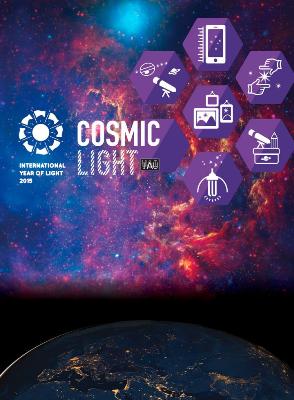Apr 17 2015
On 20 December 2013, the 68th Session of the United Nations (UN) General Assembly proclaimed 2015 as the International Year of Light and Light-based Technologies (IYL 2015). This initiative was the result of a large consortium between UNESCO and a range of scientific bodies, including scientific societies and unions, educational institutions, technology platforms, non-profit organisations and private sector partners.
 Cosmic Light poster, celebrating the International Year of Light 2015. Credit: IAU
Cosmic Light poster, celebrating the International Year of Light 2015. Credit: IAU
Invited by the IYL2015 Steering Committee to organise activities under the Cosmic Light theme for the IYL2015, the International Astronomical Union recognises the importance of light for astronomy and supports the notion that technology leading to greater energy efficiency is key to the preservation of dark skies.
IAU has since joined forces with CIE (International Commission on Illumination) and IDA (International Dark-Sky Association), forming a collective of experts in lighting, light pollution awareness, and education and outreach who all strongly support the preservation of the night skies, their quality, and our fundamental right to the night sky. As light pollution increasingly becomes excessive, misdirected light has profound consequences on our perception of the night sky, interferes with astronomical research, disrupts ecosystems, leads to adverse health effects and wastes energy.
Following a public call that gathered many high quality proposals from around the world, the IAU has identified several key projects -- the Cosmic Light cornerstone projects -- that in 2015 are making a difference to people's awareness of the problems caused by light pollution andthe importance of understanding our Universe through cosmic light:
Cosmic Light Awareness
A cornerstone of the programme, focused on involving schools around the globe in awareness campaigns within the framework of the International Year of Light. The diversity of the networks involved will allow the programme to reach 100 countries with three project components:
- The IYL2015 Dark Sky Meter App, already launched for iPhone. With this free app the user can get instant information about the night-sky quality and contribute directly to science.
- The Cosmic Light EDU kit, which has launched its official website today. There, teachers will have access to a virtual kit that gathers many activities, tools and other resources on the topic of the science of light. This kit will feature continued support for teaching communities around the world, and a special component designed for children with visual impairments will be also incorporated.
- The Quality Lighting Teaching Kit, focusing on light pollution awareness, will increase student and public awareness of quality lighting issues through online tutorials, teaching kits, and hands-on activities. The programme and kit will be disseminated to formal and informal audiences worldwide. And by choosing developing countries or countries most affected by poor quality lighting, this project seeks to produce a lasting legacy.
Light: Beyond the Bulb (LBTB)
An open-source international exhibition programme for the International Year of Light designed to showcase the incredible variety of light-based scientific research being done today, spanning the entire electromagnetic spectrum, as well as many scientific disciplines and technological platforms. The free exhibition materials and striking images have been crowd-sourced and curated by experts for their scientific content, high-quality printability, stunning beauty and ability to engage the wider public audience. Any exhibitor can host the exhibition. So far there are 150 LBTB locations signed up for exhibits across 25 countries and 400 LBTB poster exhibit venues.
Galileoscope
A high-quality, low-cost telescope kit developed by a team of leading astronomers and science educators. No matter where you live, with this easy-to-assemble kit, educators can see and share with their audiences the celestial wonders that Galileo Galilei first glimpsed over 400 years ago, including lunar craters and mountains, four moons orbiting Jupiter, the phases of Venus, Saturn's rings, and countless stars invisible to the naked eye. Galileoscope is currently accepting pre-orders for the International Year of Light 2015 special edition, with deliveries to commence in May.
Through this set of worldwide programmes, the IAU intends to reach and engage a large number of communities, raising awareness of the need to minimise light pollution and to have a better understanding of the universe, and extends the invitation to worldwide communicators to join us for this amazing global celebration.